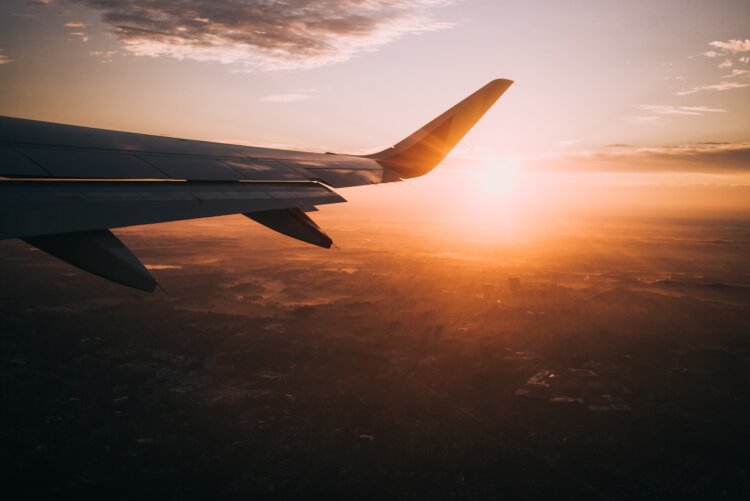
If you believe that “it’s the journey, not the destination,” you don’t have a fear of flying or travel anxiety. For people like me who do, the journey is something to endure, and the destination is the reward.
About 10 years ago, I moved from the East Coast, where I’d lived my whole life, to the West Coast. This was the right decision: It broke me out of my comfort zone, brought me new friends-as-family and created new opportunities in a new community. But I also moved more than 2,400 miles away from my tri-state area family, and more than 7,500 miles from my family in Jerusalem. Since I like my family, this means that I have to fly regularly. And every time I fly, I experience extreme anxiety.
So let’s break it down: What’s the anxiety and fear all about? And how do I prepare for my many flights during a given year, when flying presents a literal high anxiety every time?
Before I fly
This stage begins when I consider buying the ticket. I spend more time than I should making sure it’s the right flight, at the right time, at the right price; I play roulette with the prices, sometimes, tracking a flight until it’s at its projected low, or checking out the advantage to going one-way with miles, or on a different carrier; then trying to get the most comfortable of the uncomfortable economy seats.
My packing, no matter how many days in advance it starts, will continue late into the night before I travel, as I pace through my apartment, picking up things I need or might conceivably need, and figuring out how to fit everything into a carry-on so I don’t have to check a bag. Every time, it’s like I’ve never packed a suitcase before.
RELATED: How Mayim faced her fears on a trip to Utah
Then I worry about what to wear to the airport and on the plane. I want to be comfortable, for reasons that will become clear in the paragraphs below, but when I go through the airport body scanner in loose clothing, my body registers as concealing explosives. The only way around that is to wear body conforming clothing, which means I’m not comfortable; but if I wear non-body conforming clothing, I get groped by TSA. Sometimes, they’ll swab my hands, which will come up with a false positive (again for explosives), and earn me a more intimate groping in a private room with a glass of champagne to loosen me up. Except without any champagne.
So my anxiety, like my fears (which you’ll hear about next), is not irrational: It’s based on experience.
In the air
My fear of flying is not a phobia, which by definition is irrational. My fear is very rational: It’s about being trapped in a metal tube with a ton of other people and then having something go wrong. On an external level, this fear is not unique. A bump in the air surprises, continuous turbulence causes deep concern and anxiety, and the request from the pilot that flight attendants take their seats causes extreme panic.
But beyond the pilots or the planes or the flying, about once every 8-10 trips I experience vasovagal syncope, a fairly common form of fainting, in the air. Technically, it’s “a sudden drop in heart rate and blood pressure leading to fainting, often in reaction to a stressful trigger.” And my stressful trigger is airline travel. This kind of inner turbulence can—like its skybound relative—come out of nowhere. Sometimes it starts as a stomach issue or more often, feeling a wave of heat or chill or alternating heat-and-chill, like you do when you have a fever. If I feel the symptoms in time, I can stave it off with cold compresses on my neck and arms, and no one is the wiser. If I don’t, let’s just say I’ve become well-acquainted with the texture of airplane carpet. Once an episode landed me in the hospital, where I received a wristband that said “Fall Risk,” generating my joke that maybe I should wear it all the time. It’s worse when my body hormones are off, so I’m especially vigilant during my time of the month.
RELATED: How anxiety attacks and panic attacks differ
Fainting on earth is unnerving enough; in the air, when medical treatment is minimally possible, when you’re asked whether you think they need to land the plane (which is a strange thing to ask someone who’s just fainted and whose systems are still coming back online), it’s pretty terrifying. Especially to someone who has lived her entire life trying not to inconvenience people, the idea of the pilot landing the plane because I fainted is too much to consider. I believe that should not be my call.
How I cope
Because the fear is both psychological and physical, I need a solution that addresses both of those prongs. Physically, to avoid the chance of my fainting as much as possible, I set myself up for optimal body balance in the air. This means being fully hydrated, having some salt with me (pretzels are a good salt food for me), making sure to get an aisle seat so I can get up, get my blood and air circulating, and get to the restroom as soon as possible to apply compresses that will prevent me from passing out. I also need to be wearing things that are stretchy but not too tight; leggings might work, but only if they’re not skin-tight, because tight clothing cuts off circulation and increases the chance that I’ll pass out. (See above discussion of airplane-wear for more understanding of why this is all challenging.)
For my anxiety, I engage in rituals that set me up for my best chances at calmness: this includes deliberate inhales-and-exhales to try to calm my nerves, as well as imagining that I’m on a bus. “I’m on a bus, I’m on a bus, I’m on a bus,” I repeat, trying to logic myself into not panicking. I wouldn’t be alarmed if a bus ran over bumps in the road, so why should I be alarmed when a plane hits some bumpy air? (Don’t answer that question, please.) I do whatever makes me feel calm, even if it costs money or calories. Pour one out for all the cheese plates that have given their lives to help calm me down—thank you all for your service, you are not forgotten.
As the #nostigma movement gains traction and popularity, I can add my own little level of self-acceptance. By being “out” about my fears and anxieties with friends and family, I can connect with others who have travel-related anxiety and crowdsource coping strategies.
I know that there are people out there so afraid to fly that they never go anywhere. I am grateful that my anxiety and fear is more manageable than that. Because even though every aspect of the process makes me anxious, I know the value of changing your scenery and my encounters with family and friends are what makes the journey worth the struggle.


Grok Nation Comment Policy
We welcome thoughtful, grokky comments—keep your negativity and spam to yourself. Please read our Comment Policy before commenting.